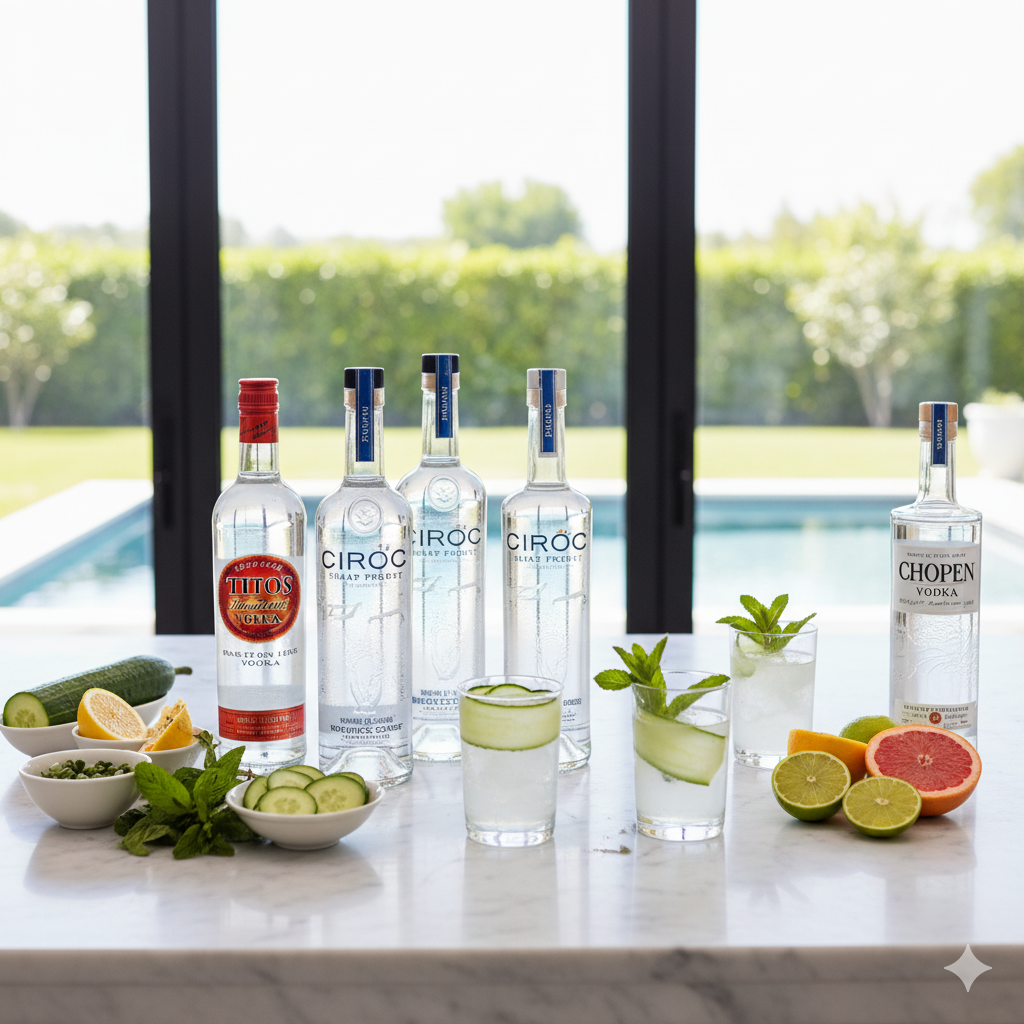The gluten free vodka conversation splits into two camps: people with actual celiac disease who need safe spirits, and wellness-focused hosts who want to accommodate guests without making it feel like medical accommodation.
Understanding which vodkas are genuinely gluten free versus which are just marketed that way prevents both health risks and social awkwardness. The distillation process theoretically removes gluten proteins from grain-based vodkas, but celiac organizations and medical professionals remain divided on whether this makes them safe. Meanwhile, naturally gluten free vodkas made from potatoes, grapes, or corn eliminate the question entirely.
For Hamptons hosts whose guest lists increasingly include people with dietary restrictions, stocking verifiably gluten free vodka isn’t performative wellness theater. It’s practical hospitality that prevents the conversation nobody wants at your party about whether distillation actually removes gluten proteins to safe levels for people with celiac disease. The answer: serve vodka that was never made with gluten in the first place, and eliminate the debate.
The premium vodka market now offers exceptional gluten free options that taste as good or better than grain-based alternatives, meaning you’re not sacrificing quality for accommodation. This represents evolution from a decade ago when gluten free meant accepting inferior products in the name of dietary necessity.
Understanding Gluten Free Vodka: Science and Safety
The technical reality of gluten in vodka is more complex than most marketing suggests, requiring understanding of both distillation chemistry and actual celiac disease risks.
The Distillation Argument
Distillation theory holds that gluten proteins are too large to evaporate and travel through distillation apparatus, meaning they remain in the mash while purified alcohol vapor becomes vodka. This suggests that all distilled spirits, even those made from wheat or rye, should be gluten free after distillation.
The Alcohol and Tobacco Tax and Trade Bureau (TTB) accepts this position, allowing grain-based vodkas to label as gluten free if distilled properly. Major vodka brands cite this regulatory approval as evidence their wheat or rye vodkas are safe for people with celiac disease.
However, the Celiac Disease Foundation and many gastroenterologists recommend avoiding grain-based spirits regardless of distillation claims. Their concern focuses on potential cross-contamination, incomplete protein removal, or individual sensitivity variations that make theoretical safety inadequate for health risk management.
The Medical Perspective
People with diagnosed celiac disease face legitimate health consequences from gluten consumption, making this more than preference or trend-following. Even trace amounts trigger autoimmune responses that damage intestinal lining, creating serious long-term health issues.
The threshold for “gluten free” labeling is less than 20 parts per million, a standard distilled grain vodkas can meet through testing. But individuals vary in sensitivity, and some celiacs react to amounts below official thresholds, making personal tolerance the relevant measure rather than regulatory standards.
Medical advice consistently recommends that celiacs choose vodkas made from non-gluten sources rather than relying on distillation to remove gluten from grain-based products. This conservative approach prioritizes health over convenience or cost considerations.
Naturally Gluten Free Sources
Vodka made from potatoes, grapes, corn, or other gluten-free sources eliminates the distillation debate entirely. These base ingredients never contained gluten, making the final product unquestionably safe for people with celiac disease.
Potato vodka represents the traditional gluten free choice, with Polish brands like Chopin and Luksusowa offering premium quality. Grape-based vodkas like Ciroc provide luxurious alternatives with distinctive flavor profiles. Corn vodka, including Tito’s Handmade Vodka, delivers American craft options at accessible price points.
The production process for these vodkas mirrors grain vodka methods, using fermentation and distillation to convert starches or sugars into alcohol. The only difference is the starting material, which happens to be naturally gluten free rather than requiring gluten removal.
Premium Gluten Free Vodka Brands Worth Serving
Quality matters as much as gluten free status. These brands deliver both safety and taste that justify their presence in luxury home bars.
Tito’s Handmade Vodka: American Craft Standard
Texas-based Tito’s produces corn-based vodka that became America’s best-selling vodka through quality and smart marketing. The gluten free status initially attracted people with celiac disease, but mainstream adoption followed as the vodka proved itself in taste and mixability.
The flavor profile offers clean, slightly sweet character that works exceptionally well in cocktails without dominating other ingredients. The corn base creates smoothness that appeals to people who find some vodkas harsh, making Tito’s accessible for both vodka enthusiasts and casual drinkers.
Price positioning delivers premium quality at mid-range pricing, creating exceptional value compared to European imports. This makes Tito’s ideal for regular entertaining where you’re serving volume without compromising on quality or safety.
The brand’s widespread availability and recognition also means guests familiar with Tito’s immediately understand you’re serving quality gluten free vodka rather than some obscure brand they’ve never heard of.
Ciroc: Grape-Based Luxury
French Ciroc uses grapes instead of grain, creating vodka with unusual character for the category. The grape base produces subtly fruity, slightly floral notes that distinguish Ciroc from neutral grain or corn vodkas.
This distinctiveness works beautifully in vodka sodas and simple cocktails where subtle vodka character enhances rather than interferes. The grape origin also creates natural talking points for guests interested in spirits, making Ciroc both functional and conversational.
Diddy’s endorsement and luxury positioning elevated Ciroc to status symbol territory, which matters for hosts whose bars function partly as social signaling. Serving Ciroc communicates both dietary consideration and lifestyle positioning simultaneously.
The premium pricing reflects both production costs from grape base and marketing investment in luxury positioning. This makes Ciroc appropriate for special occasions or guests you want to impress rather than everyday drinking.
Chopin Potato Vodka: Polish Premium
Chopin produces exceptional potato vodka that happens to be gluten free as a natural consequence of its base ingredient. The Polish distillery’s commitment to single-ingredient vodka creates pure expression of potato character without grain contamination.
The flavor offers creamy, slightly sweet profile with fuller body compared to grain or corn vodkas. This richness makes Chopin excellent for martinis and spirit-forward applications where vodka provides primary flavor and texture.
While not marketed primarily as gluten free vodka, Chopin serves that function perfectly for hosts who want premium quality that accommodates dietary restrictions without making health considerations the focal point.
The elegant bottle design and Polish heritage create premium presentation that elevates any home bar while signaling sophisticated taste in spirits selection.
Crystal Head: Distinctive Presentation
Canadian Crystal Head uses corn base to produce gluten free vodka in the iconic skull-shaped bottle that makes it instantly recognizable. The distinctive packaging creates conversation while the vodka inside delivers legitimate quality.
The flavor profile offers exceptional smoothness with subtle sweetness from corn base. Multiple distillations create clean character that works well for both neat sipping and cocktail applications.
Dan Aykroyd’s involvement and the memorable bottle design make Crystal Head more than just vodka. It functions as bar art that happens to be excellent gluten free spirit, appealing to hosts who value aesthetics alongside quality.
Use Crystal Head when you want your bar to look interesting and distinctive rather than just stocked with conventional premium brands everyone else serves.
Luksusowa: Budget-Friendly Polish
Polish Luksusowa produces quality potato vodka at price points that make premium gluten free vodka accessible for regular use. The brand proves that gluten free doesn’t automatically mean expensive.
The flavor offers classic potato vodka character with creamy texture and slight sweetness without rough edges. While not as refined as Chopin, Luksusowa delivers legitimate quality that surpasses many grain vodkas costing twice as much.
Stock Luksusowa for everyday entertaining where you need gluten free vodka in volume without premium pricing. Save expensive bottles for special occasions and serve Luksusowa for regular parties where it performs perfectly well.
Cold River: Maine Craft Excellence
Maine’s Cold River distills potato vodka using locally sourced potatoes, creating craft American alternative to European imports. The small-batch production allows quality control that larger operations can’t match.
The vodka offers clean potato character with exceptional smoothness from careful distillation. The local sourcing and craft production appeal to people who prioritize supporting domestic small producers over international industrial brands.
Use Cold River when you want to serve something distinctive that demonstrates knowledge of craft spirits beyond mainstream commercial options. The Maine origin also creates regional pride opportunities for hosts with New England connections.
Creating Gluten Free Cocktails That Don’t Taste “Free From”
Safe vodka is just the starting point. Proper cocktail construction ensures dietary accommodation doesn’t compromise taste or presentation.
Classic Martini Execution
Combine 2.5 oz gluten free vodka (potato vodka works exceptionally well) with 0.5 oz dry vermouth. Stir with ice and strain into chilled martini glass. Garnish with olives or lemon twist.
The potato vodka’s fuller body creates more satisfying martinis compared to lighter corn or grape vodkas, though all work depending on your texture preferences. Ensure your vermouth is also gluten free, as some brands use grain-derived ingredients.
This demonstrates that gluten free doesn’t mean compromising on classic cocktail execution or settling for modified versions that taste different from originals.
Moscow Mule Perfection
Pour 2 oz gluten free vodka over ice in copper mug. Add 0.5 oz fresh lime juice and top with 4-6 oz gluten free ginger beer. Garnish with lime wheel and fresh mint.
Verify your ginger beer is gluten free, as some brands use barley or wheat derivatives. Fever-Tree and Q Mixers both produce certified gluten free ginger beer that works perfectly.
The corn-based vodka’s clean profile works particularly well in Moscow mules where vodka should support rather than compete with ginger beer’s dominant flavor.
Cucumber Cooler Refreshment
Muddle cucumber slices in shaker, add 2 oz gluten free vodka, 0.75 oz fresh lemon juice, 0.5 oz simple syrup, and fresh basil leaves. Shake vigorously with ice and double-strain into highball glass over fresh ice. Top with soda water and garnish with cucumber ribbon.
This garden-fresh cocktail showcases how gluten free vodka works beautifully in vegetable-forward drinks that appeal to health-conscious guests. The cucumber and basil create sophisticated flavor profiles that align with wellness positioning.
Vodka Soda Simplicity
The ultimate low-intervention cocktail that lets vodka quality shine. Pour 2 oz gluten free vodka over ice in highball glass, top with 4-6 oz soda water, and garnish with lime or lemon.
This simple serve works perfectly for guests counting calories or avoiding sugar while still enjoying cocktails. The vodka quality becomes apparent in such minimal preparations, making premium gluten free vodka necessary rather than optional.
Bloody Mary Construction
Combine 1.5 oz gluten free vodka with 3-4 oz tomato juice, 0.5 oz lemon juice, Worcestershire sauce (ensure gluten free), hot sauce, celery salt, and black pepper. Build over ice in pint glass and garnish elaborately with celery, olives, pickles, or whatever brunch excess your aesthetic demands.
Verify all components are gluten free, as Worcestershire sauce often contains barley malt vinegar. Lea & Perrins offers gluten free Worcestershire that works perfectly.
The Bloody Mary represents ultimate gluten free cocktail because it’s naturally built from primarily gluten free ingredients requiring minimal substitution.
Hosting Considerations for Dietary Restrictions
Creating inclusive entertaining environments requires more than just buying the right vodka. Thoughtful execution prevents making anyone feel singled out or different.
Communication Without Announcement
Have gluten free vodka available without announcing it or making it the focal point of your bar setup. When someone asks about gluten free options, you can casually mention what you’re pouring without treating it like special accommodation requiring gratitude.
This approach makes dietary restrictions feel normal and expected rather than unusual requirements demanding extra effort. People with celiac disease appreciate not having their health needs highlighted publicly.
Mixer and Garnish Safety
Ensure all mixers, garnishes, and cocktail ingredients are gluten free when serving someone with celiac disease. Tonic water, soda, and citrus are naturally safe, but verify flavored mixers and syrups don’t contain gluten-derived ingredients.
Cross-contamination matters for very sensitive individuals. Use clean garnish containers and bar tools rather than implements that contacted gluten-containing ingredients.
The thoroughness demonstrates genuine consideration rather than performative accommodation that fails in execution details.
Label Reading and Verification
Don’t assume products are gluten free based on ingredients that seem safe. Barley malt, wheat derivatives, and grain-based additives hide in unexpected places including bitters, liqueurs, and flavored syrups.
Keep a mental or written list of verified gluten free products you’re serving to answer questions confidently rather than guessing or checking labels mid-party.
This preparation prevents awkward moments where someone with celiac disease asks about ingredients and you realize you don’t actually know what’s in your amaretto or whether your simple syrup is safe.
The Self-Service Bar Approach
For large parties, create a clearly labeled gluten free cocktail station where people can serve themselves without needing to ask about ingredients. Include recipes showing exactly what’s in each drink, allowing informed choices.
This setup works particularly well for health-conscious Hamptons crowds where multiple people likely have dietary preferences or restrictions beyond just gluten. The transparency appeals to anyone reading labels and monitoring consumption.
Gluten Free Vodka Myths and Marketing
The category is riddled with misinformation from both alarmists and brands making questionable claims. Understanding reality prevents both unnecessary worry and false security.
The “All Vodka Is Gluten Free” Myth
Some sources claim distillation removes all gluten, making grain vodkas safe for everyone including celiacs. This oversimplifies complex chemistry and individual variation in gluten sensitivity.
While TTB regulations allow this labeling based on testing, medical professionals recommend celiacs avoid grain-based spirits regardless. The theoretical safety doesn’t match conservative medical guidance prioritizing health over regulatory technicalities.
If you’re serving someone with celiac disease, choose vodka from gluten-free sources rather than arguing about distillation chemistry. It’s not worth the health risk to prove a point about protein molecules.
The Premium Pricing Deception
Some brands charge premium prices for gluten free vodka positioning when their production costs don’t justify the markup. Being gluten free doesn’t automatically make vodka better or more expensive to produce.
Tito’s proves quality gluten free vodka doesn’t require luxury pricing, while some obscure “artisanal” brands charge $50+ for corn vodka that doesn’t taste better than alternatives costing half as much.
Evaluate gluten free vodka the same way you assess any spirit: based on actual quality, taste, and value rather than just health claims or marketing positioning.
The Grain Vodka Controversy
The question of whether properly distilled grain vodka is safe for celiacs remains contested. Brands cite testing showing no detectable gluten, while patient advocacy groups recommend avoidance.
Rather than choosing sides in this debate, simply stock naturally gluten free vodka and eliminate the question. It’s easier than explaining distillation chemistry to someone who just wants a safe drink.
The controversy exists because both positions have merit: distillation should remove gluten proteins, but individual sensitivity varies and testing may not detect trace amounts affecting highly sensitive individuals.
Your bar just became significantly more inclusive without sacrificing quality or making anyone feel like their health needs create inconvenience. The best gluten free vodka tastes identical to or better than grain alternatives, meaning accommodation costs nothing in drink quality.
The sophistication lies in seamless inclusion where dietary restrictions feel anticipated and normal rather than special requests requiring explanation or apology. When someone with celiac disease doesn’t need to ask whether your vodka is safe because you’re already serving Tito’s or Chopin, that’s hospitality executed properly.
Ready to create a bar that works for everyone without compromise? Contact Social Life Magazine for exclusive luxury lifestyle content and entertaining insights. Subscribe to our email list for expert guidance on inclusive hospitality that defines sophisticated Hamptons entertaining.
Explore More Hamptons Bar Essentials:
- Potato Vodka vs Grain: What Premium Brands Really Taste Like
- Best Flavored Vodka Brands for Summer Entertaining in 2026
Support independent luxury journalism – Donate $5 to keep Social Life Magazine delivering the wellness intelligence that elevates your lifestyle.



